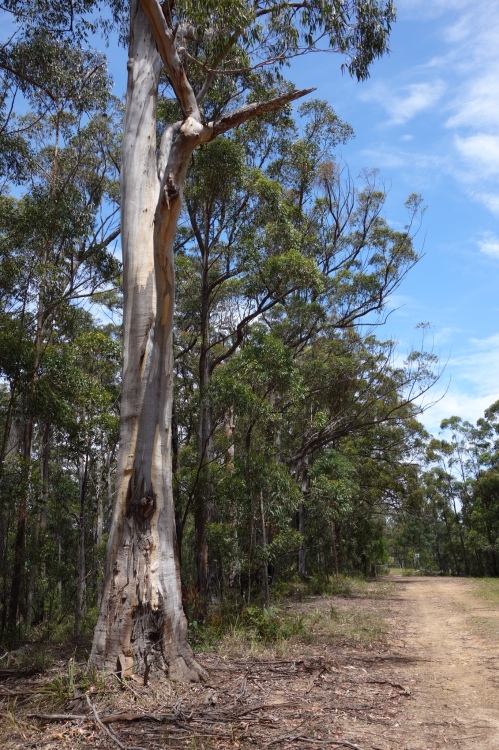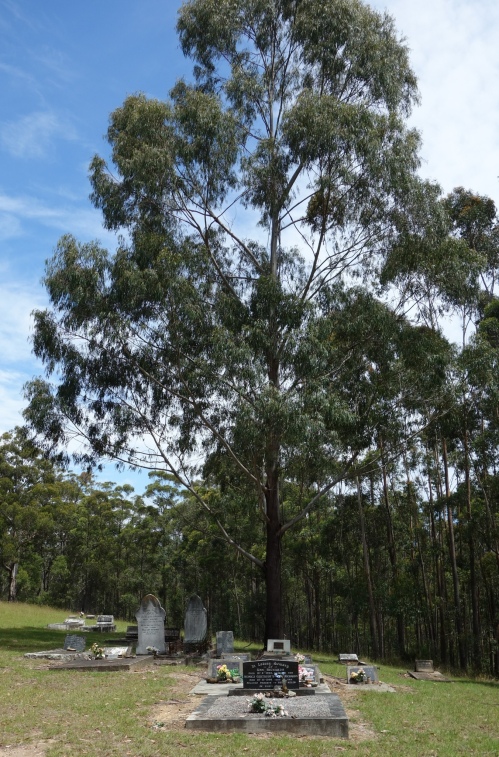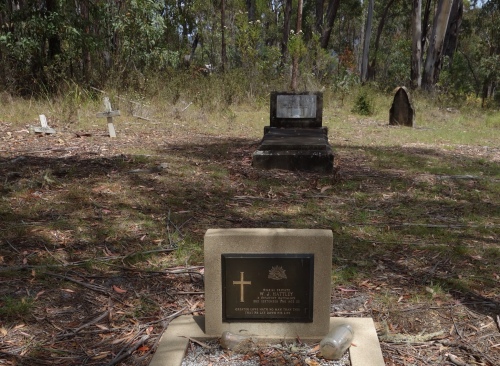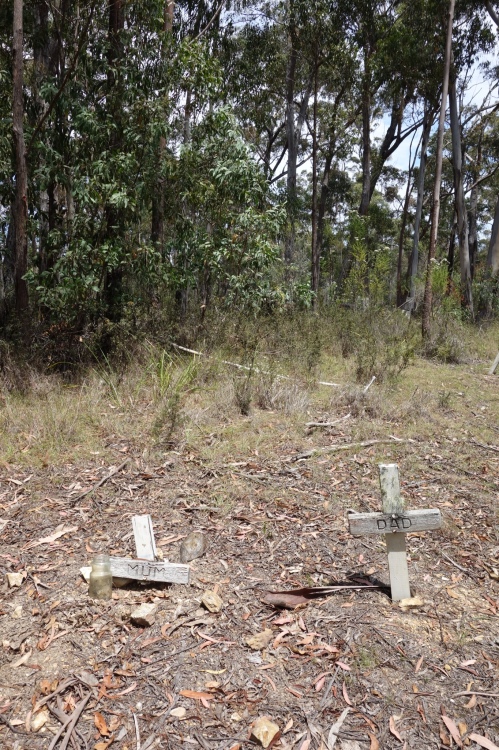The track leading off the Bodalla road to the spacious Nerrigundah graveyard moves beyond a venerable tree. Travels past saplings whose peeling bark creates grey doorways leading to orange splendour. Leads up to a gate without padlock or chain, that swings open easily. Through the gate, a pile of wombat droppings.
There are two separate clumps of graves amongst tall slender grass. Local family names. A few with military insignia. One for a young man who died on the way to the first world war. One with two rough crosses simply labelled Mum and Dad.
The graveyard itself is well cared for: slashed out to the boundary. The graves seem a bit sad and unvisited: artificial flowers scattered; plastic vases overturned: a cross broken off at the haft; lettering fallen off or faded; lichen settling in on the tombstones; small branches fallen across the slabs.
I wouldn't mind resting here when the time for permanent rest comes. But I don't think I want a monument, just a scattering on the light breeze, under the tall trees, with Nerrigundah Ridge as the background, and bark peeling to reveal the vividness of tree-flesh.
A few stanzas from Thomas Gray's “Elegy written in a country churchyard” is a possible way to end this post. You'll need to change the trees, and perhaps wonder whether the second of the stanzas is a tad dismissive of what may have been perfectly fulfilling rural lives. “Celestial fire” can take many forms, and swaying the rod of empire can actually make a person into a monster (as of course can a peaceful rural life.)
Beneath those rugged elms, that yew-tree's shade,
Where heaves the turf in many a mould'ring heap,,
Each in his narrow cell for ever laid,
The rude forefathers of the hamlet sleep.
……….
Perhaps in this neglected spot is laid
Some heart once pregnant with celestial fire;
Hands, that the rod of empire might have sway'd,
Or wak'd to ecstasy the living lyre.













I can’t imagine myself beneath a headstone either, but the vibrance of that tree nearby would be nice. 🙂 I was at a funeral just last week of a young man of only 59. So sad! The cemetery I was woffling about in my joyful post is an old one and quite atmospheric, but my family members are in the newer one, which is a bit soulless.
Hugs all round, ladies 🙂
LikeLike
The tree is only a sapling. 50 years to grow before your graving!
LikeLiked by 1 person
Well, your graveyard is completely different to the one I walk in but just as lovely, especially the orange tree 🙂
LikeLike
Have you posted about your graveyard?
LikeLike
Such a poignancy in those neglected graves Meg. And yet your words evoke peace and tranquility. The shot of the textured tree trunk is stunning.
LikeLike
The Mum and Dad ones were the ones that really got to me, and also the stone with no writing.
LikeLike
Yes, those graves got to me too. The unknown pioneers with lonely, forgotten graves. It is a very Australian concept, somehow, with echoes of the graves of the unknown soldiers who died during the First World War. Very much in our thinking at the moment.
LikeLike
Such a striking colour beneath the peeling bark. I too have been visiting a graveyard this week, but one in complete contrast to this. This one reminds me of a disused one in Ludlow that is now a nature reserve and I love the peace and solitude to be found there.
See you tomorrow!
LikeLike
Jude are you meeting Meg today? if so give her a hug from me 🙂 better still give each other a big hug from me!
LikeLike
I collect Jude from the train in about five hours. Hugs will be exchanged, and you’ll be included! Christine too. She taught me this way of blogging by meeting you.
LikeLiked by 1 person
and I am so blessed by that my dear, oops now I have tears 🙂
LikeLike
Will do!
LikeLike
It does not seem to have many visitors. That tree bark photo really caught my eye, Meg. Have a good week!
LikeLike
The graves seemed unvisited, and yet the area was well-kept. Spotted gums do amazing things when they shed their bark. Where I stay at the weekend is surrounded by them and sometimes you can hear slabs of bark falling.
A tranquil week to you too. I’m having Jude to visit from England. We met blogging.
LikeLike
Have fun, Meg! Say hi to Jude!
LikeLike
Dear, very dear Meg, How peacefully you write about facing the great unknown, and what a very special place you have chosen to rest permanently.
I too have chosen such a place. It is a small cemetery outside Canberra near Hall where many of my dear friends in Canberra reside. It is circled with mostly smallish scrawny eucalypts. It is not kempt, nor is it unkempt. It just is.
I’ll tell you more about this, and my plans for us to return to Canberra sometime hopefully relatively soon. Perhaps in your car, going to Rachel’s next Monday.
LikeLike